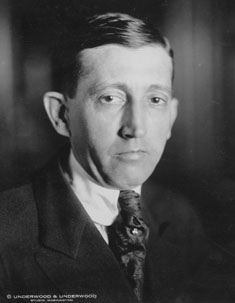| Will H. Hays  AKA William Harrison Hays AKA William Harrison Hays
Born: 5-Nov-1879
Birthplace: Sullivan, IN
Died: 7-Mar-1954
Location of death: Sullivan, IN
Cause of death: unspecified
Remains: Buried, Center Ridge Cemetery, Sullivan, IN
Gender: Male
Religion: Presbyterian
Race or Ethnicity: White
Sexual orientation: Straight
Occupation: Business, Politician
Party Affiliation: Republican Nationality: United States
Executive summary: The Hays Production Code In its early years, mainstream movies from Hollywood sometimes told stories that challenged the era's social or political conventions. A night at the movies might include nudity, vulgar language, illegal drugs, even sadomasochism. Top director William Desmond Taylor had been murdered, Charlie Chaplin had been caught with underage girls, Fatty Arbuckle was in a rape-murder scandal, and a murder had occurred in the home of Cecil B. DeMille. True or false, there was a growing perception that Hollywood was a city of decadence, drugs, orgies, gambling, prostitution, and rampant social diseases.
By the early 1920s, several cities and states had established censorship laws, requiring movies to be approved for public screenings, and allowing local officials to mandate that specific scenes be edited out prior. There were Congressional rumblings of a federal law controlling movie content, and to ward off such legislation, the film industry formed the Motion Picture Producers and Distributors of America (MPPDA), promising to bring morality to the silver screen.
Will H. Hays seemed like the perfect choice to become President of the MPPDA. He had been Chairman of the Republican Party, campaign manager for President Warren G. Harding, and Harding's Postmaster General. In the latter position, he was known for vigorous prosecutions for mailing pornographic materials through the mail. When Hays took charge of the MPPDA, his office published a blacklist of actors and workers studios should not hire, inserted moral clauses into actors' contracts, and published an informal list of suggested guidelines for film producers. Actors with partying reputations saw their careers fade, but Hollywood movies were still decried for their lack of morals.
When the Catholic Church formed its Legion of Decency and threatened nationwide boycotts, Hays installed a more formal production code, called the Hays Code, the Production Code, or simply "The Code". These rules were enacted in 1930, but included no penalties until a 1934 addendum stipulated that films could not be released without certification from the Hays Office. After that, The Code was virtually the law in Hollywood.
Depiction of homosexuality, nudity, "suggestive dances", or childbirth were prohibited, and any Christian clergymen had to be presented in a serious and respectful manner. Vulgarity, vengeance, miscegenation, naughty language, and "excessive and lustful kissing" were all against the rules. The Code decreed that the audience should never see criminals, adultery, or premarital sex in a positive light, and never see U.S. government or its employees as anything but a force for goodness. In practice, this meant that for about thirty years at the movies, bad guys never got away with their crimes, and good guys never got more than a kiss. The Hays Production Code was bad for movies as art, since moviemakers' choices were tightly constricted under the code, but it was great for movies as business, since parents had no worries about taking the whole family to see virtually any movie.
The MPPDA changed its name to the Motion Picture Association of America (MPAA) in the mid-1940s, shortly after Hays' retirement. The Code's authority began fading in the 1960s, and was eventually replaced by a Byzantine ratings system -- G, PG, R, and NC-17.
Of historical significance, in 1926, a film of Hays' voice speaking in synch with the images introduced Don Juan starring John Barrymore, a non-talkie, but the first film to feature a pre-recorded score using the new Vitaphone technology. Hays' son, Will Hays Jr, wrote the 1949 musical You're My Everything starring Dan Dailey and Anne Baxter, and was elected Mayor of Crawfordsville, IN. Father: John Tennyson Hays (attorney, b. 11-Nov-1845, d. 10-Apr-1919)
Mother: Mary Cain Hays (b. circa 1857, m. 9-Dec-1876)
Sister: Martha Hays (half-sister, from father's first marriage to Margaret Hart)
Sister: Bertha Hays Drake (half-sister, from father's first marriage)
Brother: Hinkle Cain Hays (b. 12-Nov-1890)
Wife: Helen Louise Thomas Hays (m. 18-Nov-1902, sep. 1924, div. 1929, one child)
Son: Will H. Hays, Jr. (b. 11-Dec-1915, d. 11-Aug-2000)
Wife: Jessie Heron Stutsman Hays (m. 27-Nov-1930)
University: Wabash College (1900)
Motion Picture Association of America President (1922-45)
US Postmaster General (1921-22)
Republican National Committee Chairman (1918-21)
American Bar Association
Benevolent & Protective Order of the Elks
Freemasonry
Indiana State Bar Association
Kiwanis Club
Knights of Pythias
Knights Templar
Loyal Order of Moose
Phi Delta Theta Fraternity
Shriners
FILMOGRAPHY AS ACTOR
The Celluloid Closet (13-Sep-1995) · Himself
Author of books:
The Memoirs of Will H. Hays (1955, memoir)
Requires Flash 7+ and Javascript.
Do you know something we don't?
Submit a correction or make a comment about this profile
Copyright ©2019 Soylent Communications
|